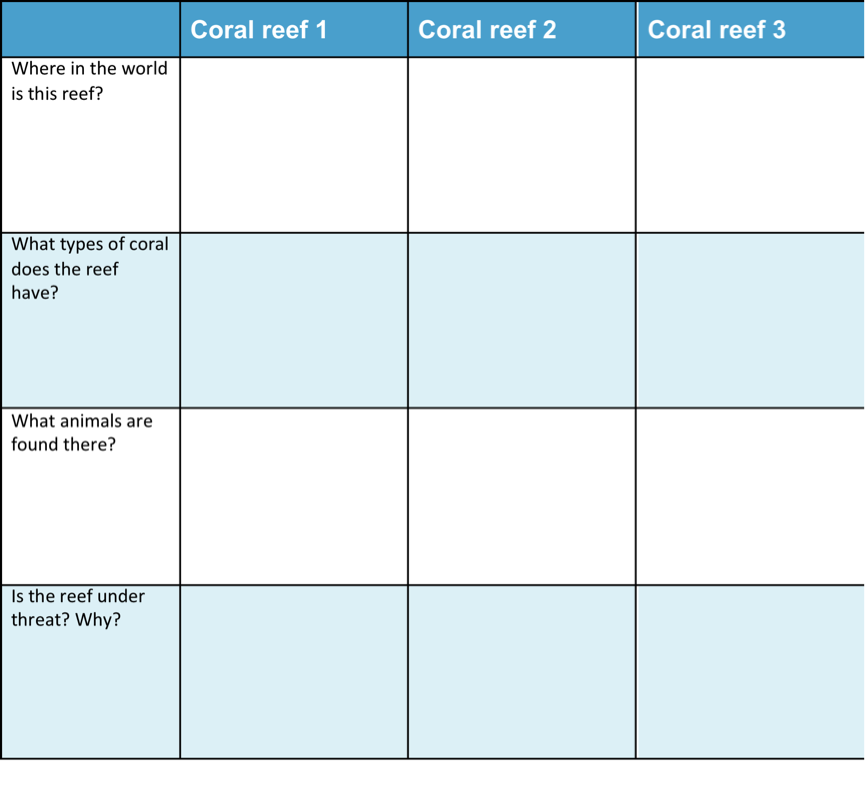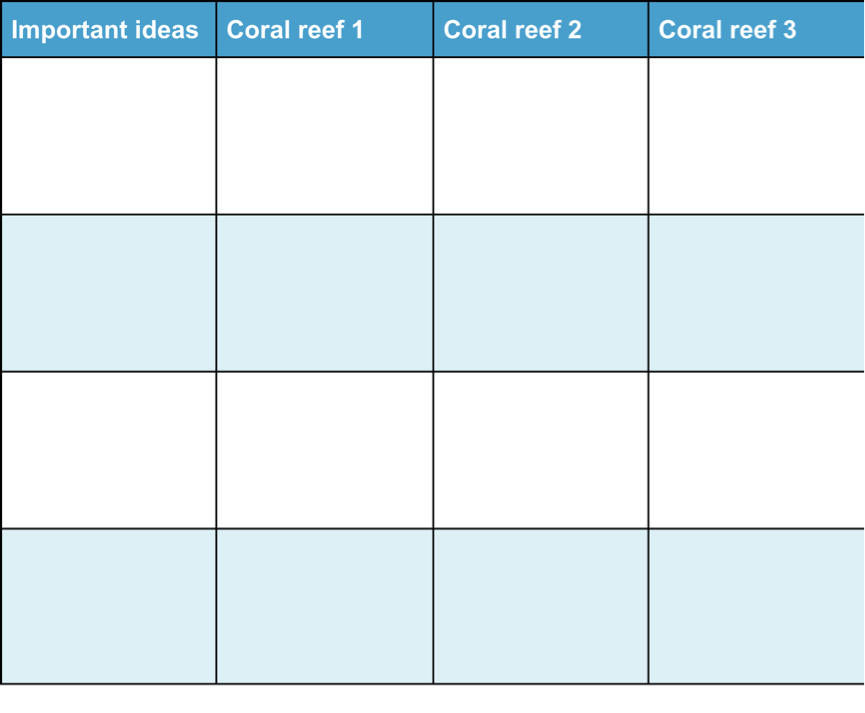Information for Teachers
Curriculum links
Australian Science Standards
BS (ACSSU44) Living things can be grouped on basis of observable features and distinguished from non-living things
SS01.2 All life forms, including human life, are connected through ecosystems on which they depend for their wellbeing
NDS (ACSHE050) Change and events in our environment
UIS (ACSHE051) Science knowledge helps people to understand the effect of their actions
New Zealand Science Achievement Objectives
LW: How living things are suited to their particular habitat and how they respond to environmental changes, both natural and human-induced
LW: Plants, animals, and other living things can be grouped into science-based classifications
NS: Scientists work together and provide evidence to support their ideas
Helpful websites
You may want to direct your students to some or all of these websites to help with their investigations.
The Ducksters education site provides information about different types of coral reefs and the zones that occur in them
https://www.ducksters.com/science/ecosystems/coral_reef_biome.php
Students can view a video to get a better idea of what it is like to be in a coral reef:
https://www.youtube.com/watch?v=J2BKd5e15Jc
This National Geographic video gives additional information about coral polyps and coral reefs and explains the problem of coral bleaching.
https://video.nationalgeographic.com/video/101-videos/0000015f-9331-d8e7-a7ff-f77d2dfb0000
This website has an interactive map that will help students to find the names and location of coral reefs around the world.
https://www.wri.org/our-work/project/reefs-risk/interactive-map
How to search the internet
1 Keep your request short
Fewer words will give a more accurate search.
2 Choose exactly what you want
For example: Arctic Circle Climate
3 Use quotes
Double quotes around a set of words tell the search engine to consider those exact words in that exact order without any change. For example: “Arctic Circle Climate”
4 Use the plus sign (+)
If you add a plus sign (+) between words, the internet will search for all the words. For example: migrate+birds+whales+mammal
5 Use the minus sign (–) to say what you don’t want
Use a minus sign (–) to show words you do not want to appear in your results. For example: if you search for burrowing animals and do not want mammals in your search, –mammals will exclude mammals. Note that you need to put a space before the minus sign for the word to be excluded.
6 Be very clear about what you don’t want
Part 1
Ask questions and make predictions
After reading The Coral Reef, you may have many questions about how coral reefs grow and change and why they are important to many different sea animals.
List your questions
- Compare your list with questions that others have.
- Choose a question you would like to investigate.
- You can work alone, with a partner, or in a small group.
You may want to choose one or more of these questions to investigate
Q1. Are all coral reefs the same?
Q2. Why are coral reefs important?
Q3. What is happening to coral reefs today?
Q4. What can be done to protect coral reefs so that future generations can enjoy them?
Go to Part 2 Plan and investigate →Part 2
Plan and investigate
Do searches in the internet or in books or talk to people who can help to find the information you are looking for.
Your teacher may suggest suitable websites for further information.
Go to Part 3 Record and analyse data →
Part 3
Record and analyse data
Find a way of recording your information that will allow you to see any patterns in the data.
Data Chart for coral reefs of the world
 Download Chart
Download Chart
Go to Part 4 Evaluate the information →
Part 4
Evaluate the information
1. Look over the information you have gathered and the patterns you have found.
What is the same about where the coral reefs are found?
2. Search for other patterns.
Are the coral reefs marine parks?
Are any of the reefs under threat?
3. Makes notes about what you find.
Go to Part 5 Communicate and share ideas →Part 5
Communicate and share ideas
Look over all of the information that you have gathered in your investigation.
What are the most important ideas about coral reefs?
Make a chart showing the most important ideas.
 Download Chart
Download Chart
← Return to menu
